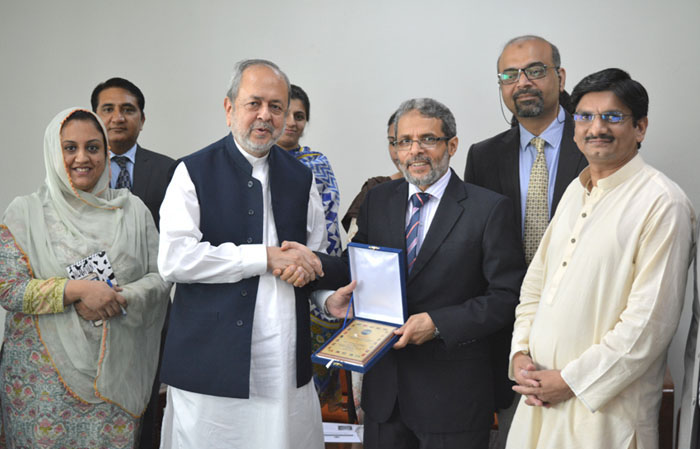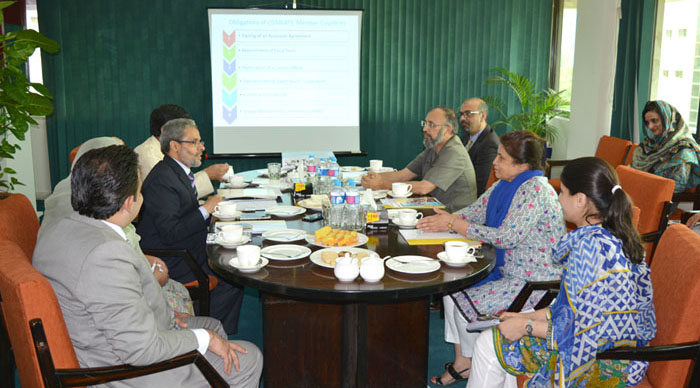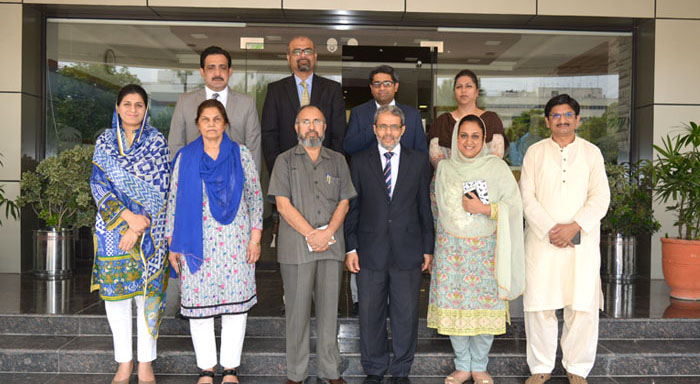Upon invitation from the Executive Director COMSATS, Dr. S.M. Junaid Zaidi, the Ambassador of Yemen to Pakistan, H.E. Mohammed Motahar Alashabi, visited COMSATS Secretariat on August 18, 2017. The purpose of the invitation was to brief His Excellency on the projects and programmes of COMSATS, delineate the benefits and obligations of COMSATS’ membership as well as to renew the past invitations to Yemen to join COMSATS. Also present on the occasion were Ambassador Fauzia Nasreen and Advisor Programmes COMSATS, Mr. Tajammul Hussain.
Dr. Zaidi thanked his Excellency for the visit and gave him a brief overview of COMSATS and its programmes. He believed that the membership of COMSATS is going to be very beneficial for both Yemen and COMSATS, as the two could cooperate with one another as well as other Member countries and institutions. He also highlighted the huge potential of this collaboration.
The Executive Director presented COMSATS as a realization of Dr. Salam’s vision to bring together policy makers and scientists of developing countries for joining their scientific and technological strengths for mutual benefit. He walked the ambassador through the organizational structure of COMSATS as an IGO, its projects, programmes, and finances. The Ambassador was informed that COMSATS currently has 25 member states and a 21 institution-strong Network of Centres of Excellence. Various tiers of the organizational structure were also explained to familiarize the Ambassador with the operations of the organization, at the Heads of State level (Commission), Ministerial Level (Consultative Committee), and Network institution level (Coordinating Council). The technical foresight, he further informed, for the programmes and overall operations of COMSATS comes from an International Technical Advisory Committee of COMSATS.
Referring to COMSATS’ earlier invitations to Yemen to join COMSATS, Dr. Zaidi urged the Am >bassador to take up the matter with the relevant officials of the Government of Yemen. Highlighting the benefits and obligations of COMSATS’ state membership, Dr. Zaidi opined that Yemen could greatly benefit from COMSATS’ projects and programmes. Underscoring the success of COMSATS Institute of Information Technology (CIIT), Dr. Zaidi informed the Ambassador that COMSATS could help Yemen establish similar top-class higher education institutions in the country. He also referred to a feasibility study in the past, conducted by COMSATS for Yemen. He highlighted the recent efforts for further institution-building in COMSATS’ member countries, with Nigeria as one of the interested countries. The consultations and facilitation being sought by British, French and German universities was also brought to the Ambassador’s notice.
>bassador to take up the matter with the relevant officials of the Government of Yemen. Highlighting the benefits and obligations of COMSATS’ state membership, Dr. Zaidi opined that Yemen could greatly benefit from COMSATS’ projects and programmes. Underscoring the success of COMSATS Institute of Information Technology (CIIT), Dr. Zaidi informed the Ambassador that COMSATS could help Yemen establish similar top-class higher education institutions in the country. He also referred to a feasibility study in the past, conducted by COMSATS for Yemen. He highlighted the recent efforts for further institution-building in COMSATS’ member countries, with Nigeria as one of the interested countries. The consultations and facilitation being sought by British, French and German universities was also brought to the Ambassador’s notice.
Other projects of COMSATS highlighted by Dr. Zaidi included COMSATS’ Telehealth, International Thematic Research Groups, and capacity building events.
The Ambassador thanked the Executive Director for the invitation to COMSATS Secretariat and briefing on COMSATS. He considered the mission of COMSATS to bring developing countries together for joint efforts for development a noble cause. He also appreciated Dr. Zaidi’s role in promoting IT education in Pakistan and showed faith in his leadership of COMSATS. Referring to the socio-economic instability in Yemen, he welcomed the opportunities offered by COMSATS. He hoped that more Yemeni youngsters could have access to specialized institutions in future. He noted that COMSATS’ engagement with Yemen is not new, and recalled efforts of outreach from COMSATS to the Government of Yemen. He welcomed the renewed invitation to Yemen to join COMSATS, and hoped to duly take it up at relevant fora.
Ambassador Fauzia brought to the Ambassador’s notice the scholarships at CIIT that Yemen’s youth could benefit from, while Mr. Tajammul Hussain informed him how to benefit from the same, and scholarships and fellowships offered by other Centres of Excellence of COMSATS to its Member States. The Ambassador was interested to know if scholarships for undergraduate studies are also available for Yemeni students, to which he was informed that although no such scholarships exist at the moment, however, such possibilities could be discussed at the meeting of the Board of Governors of CIIT, which is headed by Executive Director COMSATS.
The Ambassador, who was handed a formal letter of invitation to Yemen to join COMSATS, departed on a cordial note of cooperation and mutual respect and pledged to respond to what he had learnt during the meeting in a week’s time.








